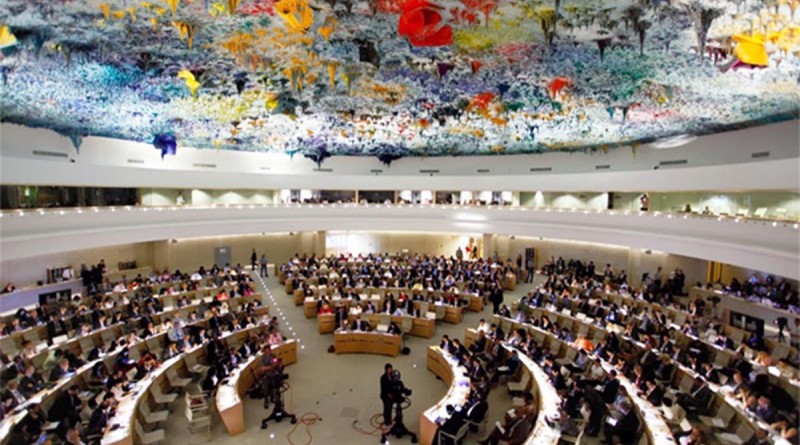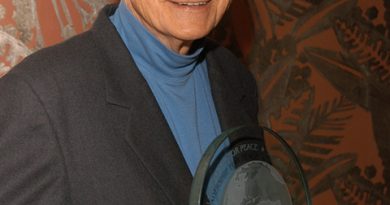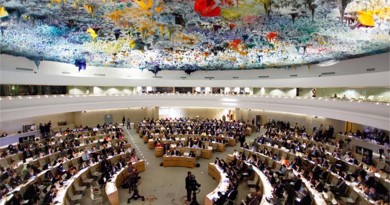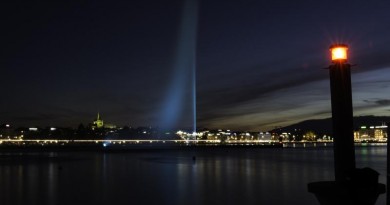Nonkilling at the Human Rights Council’s 48th session
Though the UN in Geneva has been suppler on COVID restrictions than the host country, allowing people in the premises without a COVID pass and thus guaranteeing universal access to all accredited delegates, the 48th session of the human rights council was still held without or with very limited physical presence. The Palace is under renovation, and therefore, it does not have a big enough room to assure proper distancing to all State delegations and other stakeholders at the same time. This has major inconvenient for our work as we are barred from a large part of our informal work and as we are required to prepare video statements (no zoom for NGOs) a day ahead of the debate, thus not knowing or adapting our statements to what is being said therein. Videos are also much longer to prepare than oral statements.
The Council adopted without opposition (4 abstentions) the establishment of a right to a safe environment and the Council asked to the General Assembly to do likewise. This is progressively opening the door for the full legal and universal recognition of the right to a healthy and sustainable planet. A good step towards setting the proper human standards regarding our vital environment.
Complimentary to the issue of a right to healthy environment, a special rapporteur on “climate change and human rights” will be designated at the next session and the Advisory Committee of the Human Rights Council is required to produce a study on new technologies and climate change.
The Council also decided to designate a special rapporteur for Afghanistan, thus swiftly acting on the human rights issues there. We are looking forward for the recognition of a right to peace for all afghani people, as we also claimed and proclaimed it for the people in Tigray during the session. The video of our intervention can be watched here and our statement can also be downloaded.
The Council adopted its the biennial resolution on death penalty. There is on the topic a yearly high-level debate. Three years ago it was about the penalty being of a cruel, degrading and inhumane nature for the ones condemned, but also for their relatives. Two years back the panel was on the absence of a deterrent effect of the penalty. We made statements at both. This year the focus was on the requirement for, and the importance of transparency on all aspects of the issue. Next year’s debate will be on what is called “most heinous crimes”; the only ones for which international law still permits, by exception, the application of the death penalty. It is regressing worldwide (Sierra Leone abolished it on the 8th of October) and indeed the Center for Nonkilling regularly recalls that the protection of life can only be done and done well when the State is exemplar and itself Nonkilling!
Sadly, and for the first time in its history (and in our opinion a shocking mistake), the Council saw the termination of an inquiry mechanism: the one on Yemen. This does not mean that accountability for what it is going on there will be suspended, though evidence will be harder to garner.
Our work at the Council
The most salient part of CGNK’s work during this session is certainly our declaration on “Nonkilling education” during the high-level panel convened for the 10th anniversary of the Declaration on Human Rights Education and Training. We recalled the central nature of life and asked for reverence for life and for the Nonkilling principle to be integrated into all human rights teaching curricula. Please watch the video here. The text of our intervention is also available.
Our director, Joám Evans Pim, made written and oral statements related to hazardous waste and dam tailings, highlighting some industry bad influence on standard processes. The video of our intervention can be seen here, while the written statement is available in English, French and Spanish (n° 183).
Then we did our regular work with the Universal Periodic Review of human rights in all countries regarding the swift ratification of the genocide convention. To recall, each member State of the UN passes every five years in front of the Council for a peer-to-peer review of its Human Rights situation.
During this sessions six countries were on called upon, by CGNK and then usually by Armenia, but only to ratify the convention on the prevention and the punishment of the crime of genocide. All but one accepted to do so. However, the process is slow and not always followed through, therefore we made statements for Niger, Palau, Sierra Leone and Solomon Islands (who declined wanting to ratify in a near future. All videos are available in the following links:
- Niger: Video and text.
- Palau: Video and text.
- Sierra Leone: Video and text.
- Solomon Islands: Video and text.
Our original submissions, made nine months ago are on CGNK’s website.
Sadly, due to time and resources constraints, we were not able to make statements for Somalia, which really needs to ratify the convention and for Mozambique, for which we had made a more comprehensive submission, looking at more aspects of the rights to life and peace.
The work at the United Nations needs your support. We welcome volunteers and nationals willing to enhance with us the quality and respect for life and nonkilling, locally and globally.
We are also in dire need to make this work a decently paid work. With a little more resource, we could do a lot more to raise the importance of life for each and all and to step by step approach nonkilling fulfillment universally. Please consider of making a donation or a tip, directly at CGNK or using either ones of these websites: Leetchi or Tipeee.
We also encourage you to subscribe to our monthly newsletter (on the right of the page).




